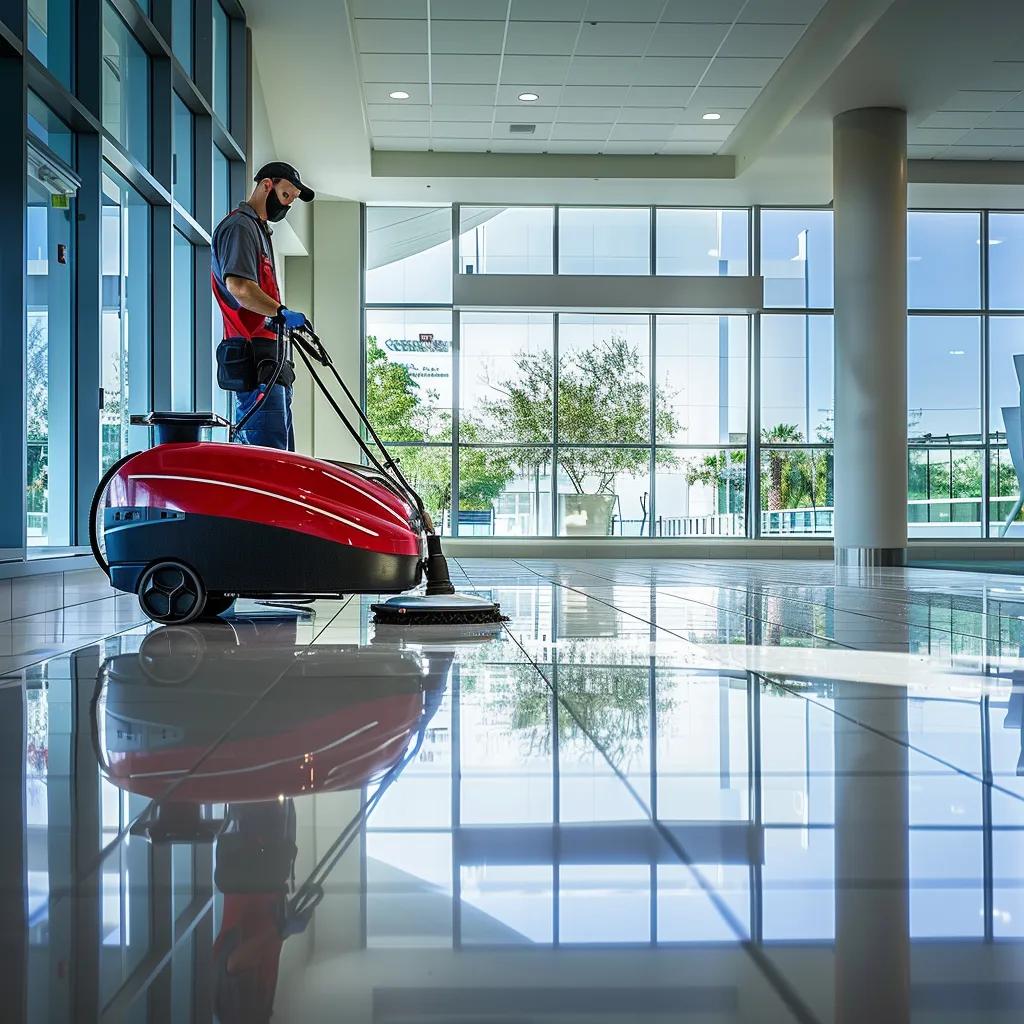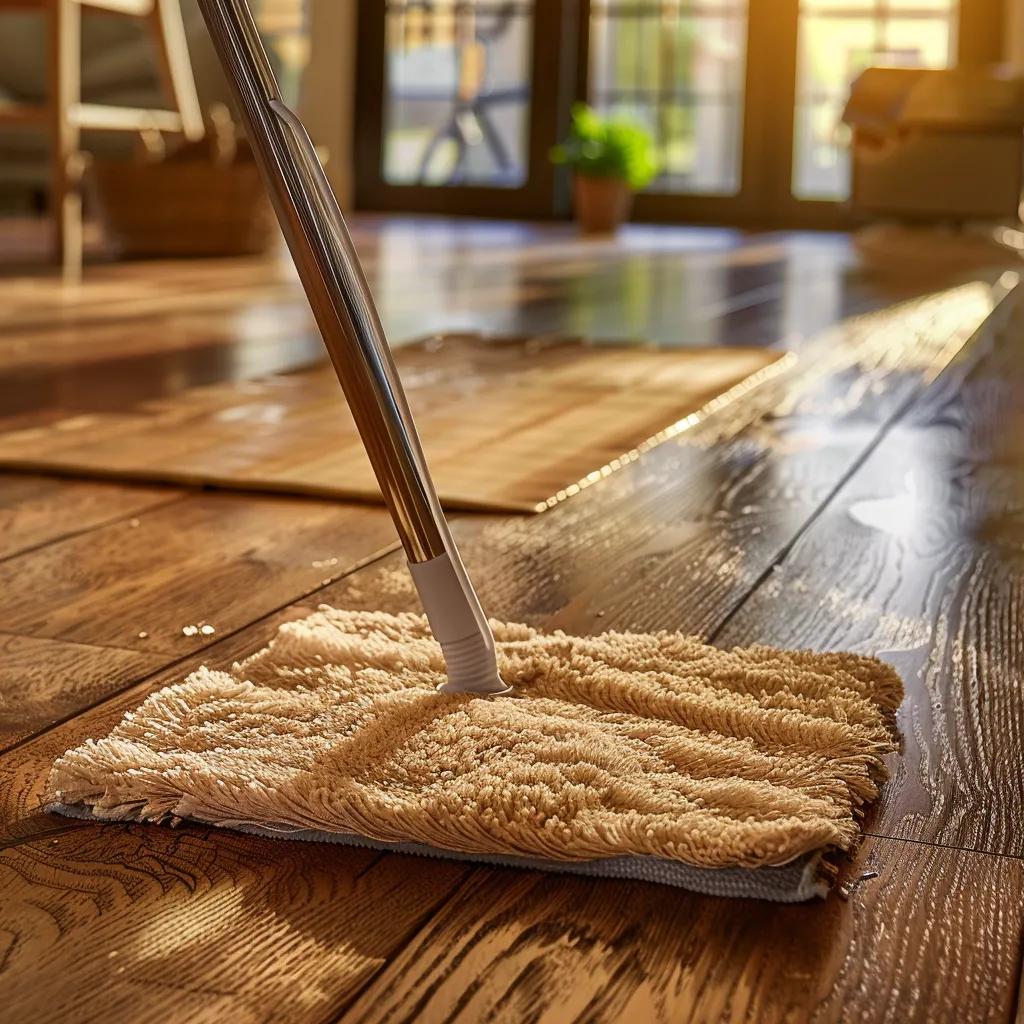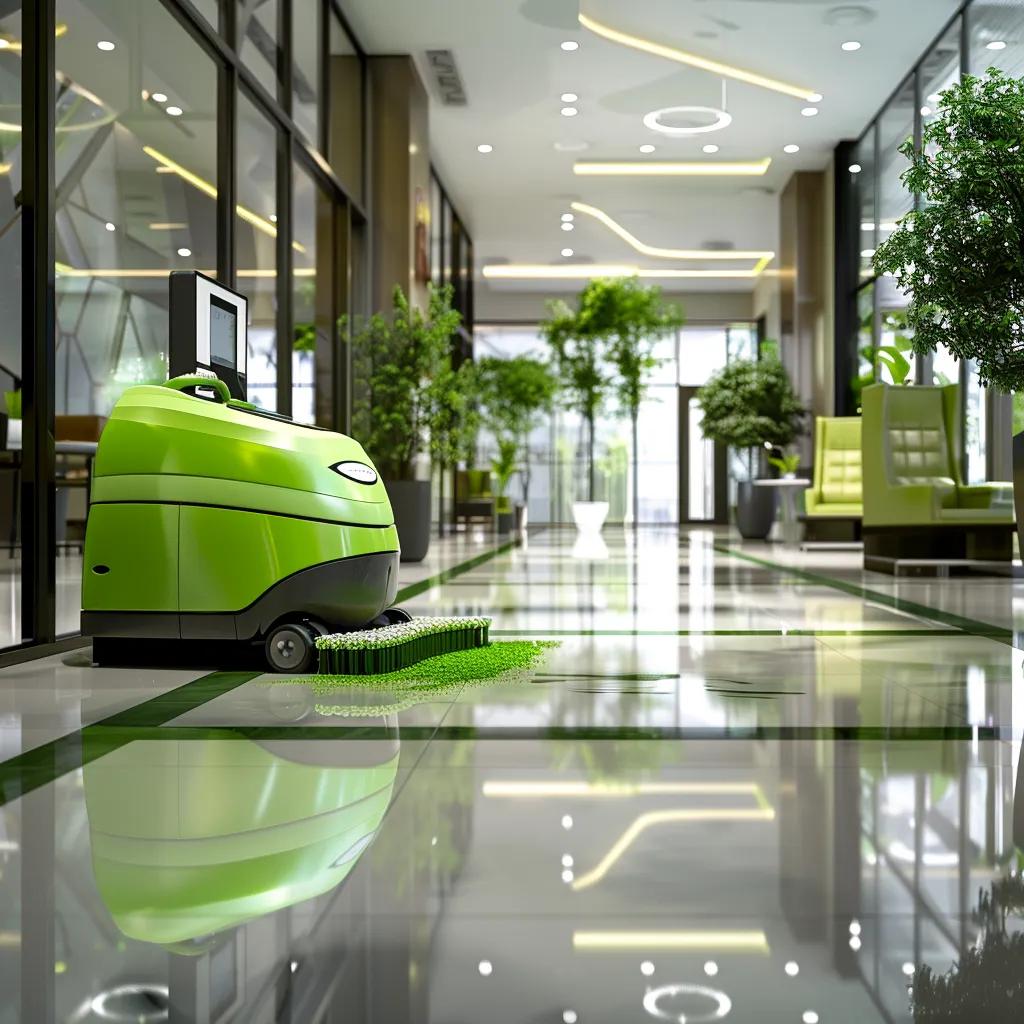
Optimizing Commercial Floor Care: Best Practices for Longevity
Effective commercial floor maintenance can reduce replacement costs by up to 90% and safeguard workplace safety from slip hazards. Businesses seeking efficient floor maintenance strategies must match each surface type with the ideal cleaning mechanism, frequency, and protective treatment to ensure longevity, hygiene, and pristine appearance. This guide maps the best practices for seven major floor materials, core cleaning methods, professional service advantages, eco-friendly solutions, essential equipment, and solutions to common challenges—empowering Macomb County, Oakland County, and Metro Detroit businesses to partner with McCoy Maintenance for tailored commercial floor care.
What Are the Key Commercial Floor Types and Their Specific Care Needs?
Hardwood, vinyl, concrete, tile, carpet, linoleum, and rubber flooring each demand distinct maintenance protocols to preserve durability, slip resistance, and aesthetic appeal. Matching material porosity, finish type, and traffic level to cleaning agents and techniques ensures optimal protection and cost efficiency.
How Should Hardwood Floors Be Maintained in Commercial Spaces?

Hardwood floors require gentle cleaning to preserve finish integrity, mechanical buffing to restore gloss, and periodic refinishing for long-term protection. Regular dust mopping removes grit that scratches protective coatings, while damp mopping with pH-neutral wood cleaner dissolves oils without raising the wood grain. Annual refinishing or recoat treatments rejuvenate protective sealants, preventing moisture intrusion and wear.
Advanced practitioners schedule buffing every 3–6 months to realign micro-scratches and apply a thin maintenance coat, preserving slip resistance and rich appearance.
Hardwood Floor Maintenance
Proper maintenance of hardwood floors, including dust mopping and periodic refinishing, is crucial for preserving their appearance and extending their lifespan. Regular cleaning removes abrasive particles, while refinishing protects against moisture and wear, maintaining the floor’s integrity and aesthetic appeal.
This research supports the article’s recommendations for hardwood floor care, emphasizing the importance of both routine cleaning and periodic maintenance to prevent damage and maintain the floor’s finish.
What Are the Best Practices for Commercial Vinyl Floor Cleaning and Maintenance?
Vinyl Composite Tile (VCT) and Luxury Vinyl Tile (LVT) benefit from systematic stripping, waxing, and neutral-pH damp mopping to maintain abrasion resistance and shine. Daily dust mopping prevents grit buildup, while weekly damp mopping with a microfiber mop extends wax film life. Quarterly stripping removes worn finish, and re-application of a high-performance polymer wax restores slip-resistant gloss.
Link to vinyl floor stripping and waxing services for professional support in Metro Detroit.
How Do You Properly Clean and Seal Commercial Concrete Floors?
Concrete floors combine porosity with high abrasion tolerance, requiring deep scrubbing and penetrating sealers to block stains and dust. Initial alkaline-based scrub removes oil and dirt, followed by acid-etch treatments to open pores for sealer penetration. Applying a water-based or silane/siloxane sealer creates a breathable barrier that repels moisture, oil, and chemical spills.
| Entity | Attribute | Value |
|---|---|---|
| Concrete Floor | Cleaning Method | Alkaline auto-scrubbing |
| Sealing Treatment | Sealer Type | Water-based or silane/siloxane penetrating |
| Benefit | Durability | Stain resistance and dust control |
Sealed concrete floors support easier daily maintenance and mitigate slip hazards, directly feeding into broader floor hygiene protocols.
What Are Effective Methods for Tile and Grout Cleaning in Businesses?
Tile and grout systems require targeted alkaline cleaners, high-pressure scrubbing, and grout sealing to prevent discoloration and mold growth. Pre-treat grout lines with a specialized alkaline detergent, use an auto-scrubber with nylon brushes for tile surfaces, then rinse thoroughly. After drying, apply a penetrating grout sealer to repel water and stains.
Effective cleaning keeps grout joints intact, avoids haze, and readies surfaces for daily damp mopping, driving a seamless transition into carpeted or hard surface zones.
How Should Commercial Carpets Be Cleaned for Longevity and Hygiene?
Commercial carpets demand hot-water extraction or low-moisture encapsulation to remove deep-seated soils, allergens, and bacteria while minimizing downtime. Hot-water extraction flushes soil and cleaning solution from pile fibers under high pressure, ensuring 80–100% soil removal. Alternatively, encapsulation uses polymers that crystallize soils for quick vacuum pickup, reducing drying time.
Routine vacuuming with HEPA-filtered vacuums and interim spot treatments preserve appearance and indoor air quality, supporting workplace health standards.
What Are the Maintenance Tips for Linoleum and Rubber Flooring?
Linoleum and rubber require pH-neutral cleaners, periodic buffing, and protective coatings to maintain slip resistance and colorfastness. Daily dust mopping and weekly damp mopping with an enzyme-free, neutral cleaner prevent surface dulling. Biannual spray buffing restores shine, while an acrylic maintenance coat every 3–6 months preserves protective layers.
These methods guard against oxidation and abrasion—critical for high-traffic corridors in schools and medical facilities—and pave the way for core cleaning strategies.
What Are the Essential Floor Care Methods for Maintaining Commercial Floors?
Commercial floor care hinges on routine debris removal, intermediate gloss restoration, finish renewal, and periodic deep sanitation to protect staff, visitors, and facility investments.
How Often Should Sweeping, Mopping, and Vacuuming Be Performed?
Daily sweeping or dust mopping removes loose debris that scratches finishes; daily vacuuming in carpeted zones extracts dust and allergens; weekly damp mopping with microfiber tools eliminates soil film.
| Entity | Attribute | Recommended Frequency |
|---|---|---|
| Debris Removal | Sweeping/Dust Mop | Daily |
| Soil Film Control | Damp Mopping | Weekly |
| Allergen Removal | Vacuuming | Daily in carpeted areas |
When and How Should Floor Buffing Be Used for Commercial Floors?
Floor buffing restores gloss by realigning finish particles and smoothing micro-abrasions; use a 1,500–3,000 RPM buffer with a soft pad every 3–6 months depending on traffic. Intermediate buffing with a maintenance-grade pad and spray buff solution quickly revives shine and slip resistance without stripping finish, making it an efficient bridge between routine cleaning and full refinishing.
What Is Floor Stripping and Waxing, and Why Is It Important?
Floor stripping removes aged finish and embedded contaminants, while waxing replenishes a protective polymer layer that shields against abrasion, spills, and UV fading. This two-step process restores slip resistance, enhances reflectivity for better lighting economics, and extends finish life—reducing replacement expenses by up to tenfold.
Link to professional floor stripping and waxing services to schedule a full-cycle restoration.
How Do Deep Cleaning Methods Improve Commercial Floor Hygiene?
Deep cleaning employs auto-scrubbers, hot-water extraction, steam cleaning, and disinfection to eradicate bacteria, allergens, oils, and stubborn soil, delivering a sanitized environment that supports health and compliance standards. By combining mechanical agitation, high-pressure rinsing, and EPA-registered disinfectants, deep cleaning prevents microbial buildup, safeguarding both hard and soft surfaces and reinforcing everyday maintenance routines.
How Do Professional Floor Care Services Enhance Commercial Floor Maintenance?
Professional floor care services leverage specialized equipment, certified technicians, and proven protocols to deliver uniform results, reduce liability, and maximize asset value.
What Are the Safety and Hygiene Benefits of Professional Floor Care?
Benefits of Professional Floor Care
Professional floor care services offer significant advantages, including enhanced safety, extended floor lifespan, and cost savings. Expert cleaning minimizes slip and fall incidents, while scheduled maintenance prevents damage and reduces the need for costly replacements, ultimately maximizing the value of the flooring investment.
This citation reinforces the article’s claims about the benefits of professional floor care, highlighting the importance of expert services for safety, longevity, and cost-effectiveness.
How Does Professional Maintenance Extend Floor Lifespan and Save Costs?
Scheduled maintenance plans prevent finish degradation, scratches, and staining that lead to costly repairs or replacements. By applying preventive coatings and executing timely refinishing, businesses avoid premature surface replacement—saving up to 80% on long-term capital expenditures.
Why Choose Customized Floor Care Plans for Different Business Types?
Offices, schools, and medical facilities exhibit varied traffic patterns, hygiene standards, and regulatory requirements. Tailored plans align cleaning frequency, product selection, and equipment intensity to each environment’s needs—ensuring efficiency and compliance. McCoy Maintenance’s customized schedules adapt to seasonal demands, special events, and emergency response protocols for uninterrupted operations.
How Does Local Expertise Impact Floor Care Quality in Metro Detroit?
Local providers intimately understand Macomb County and Oakland County facility challenges—weather-related grit, regional spill risks, and industry-specific regulations. McCoy Maintenance’s 40-year presence in Metro Detroit delivers prompt response times, industry-tested green solutions, and partnerships with local suppliers to secure reliable, cost-effective service.
What Are the Best Eco-Friendly Floor Care Solutions for Commercial Spaces?

Sustainable floor care balances performance with environmental stewardship by reducing chemical load, conserving water, and using energy-efficient equipment.
Which Sustainable Practices Reduce Environmental Impact in Floor Care?
Water-conserving techniques (microfiber mops, spray buffing), chemical dilution control systems, and waste-minimizing packaging significantly lower resource consumption. Routine training on green protocols ensures staff apply only measured quantities of eco-certified solutions, cutting water use by up to 50%.
What Are the Benefits of Using Green Cleaning Products and Equipment?
Green Seal and ECOLOGO certified products contain non-toxic, biodegradable ingredients that minimize VOC emissions, protect surface finishes, and safeguard occupant health. Energy-efficient auto-scrubbers and vacuums with variable-speed motors reduce electricity draw, lower noise levels, and extend battery life—delivering sustainable performance without compromising results.
How Can Businesses Implement Water and Energy Efficient Floor Maintenance?
Adopting high-efficiency washers and auto-scrubbers with onboard dosing systems optimizes water and chemical use per square foot. Scheduling deep cleaning during off-peak hours leverages lower utility rates and avoids peak demand surcharges, further reducing operational costs and environmental footprint.
What Certifications and Eco-Labels Should Businesses Look For?
Look for Green Seal GS-37, ECOLOGO UL 2794, and LEED compliance to ensure products and processes meet rigorous environmental and performance criteria. Certified programs validate product safety, ingredient transparency, and lifecycle sustainability—helping businesses benchmark green cleaning metrics and support corporate responsibility goals.
What Equipment and Technology Are Essential for Efficient Commercial Floor Care?
Investing in the right tools—from basic mops to robotic scrubbers—underpins consistent, high-quality cleaning outcomes while optimizing labor and utility expenditures.
Which Tools Are Best for Sweeping, Mopping, and Buffing Commercial Floors?
A combination of microfiber dust mops, ergonomic wet mops, and low-speed buffers delivers the ideal balance of soil removal and finish protection. Microfiber heads trap particles in their fiber structure, reducing cleaning solution volumes and chemical residues.
| Entity | Attribute | Value |
|---|---|---|
| Dust Mops | Material | Microfiber |
| Wet Mops | Feature | Ergonomic handle and removable head |
| Floor Buffers | Speed Range | 1,500–3,000 RPM with interchangeable pads |
How Do Industrial Vacuums and Auto Scrubbers Improve Cleaning Efficiency?
HEPA-filtered industrial vacuums capture 99.97% of particulates, protecting indoor air and preventing abrasive grit from damaging floor finishes. Auto-scrubbers combine mechanical scrubbing, solution application, and wet pickup in a single pass—cutting labor time by up to 60% and ensuring consistent finish retention across large areas.
What Innovations Are Emerging in Commercial Floor Cleaning Technology?
Robotic floor scrubbers autonomously navigate based on LIDAR mapping, delivering consistent coverage and freeing staff for detail work. Electrostatic sprayers and UV-C disinfection systems augment traditional deep cleaning by targeting microbial contaminants on hard and soft surfaces—heightening hygiene without manual contact.
What Are the Most Common Floor Care Challenges and How Can They Be Solved?
Persistent stains, scratches, and bio-growth can undermine appearance and safety unless addressed with specialized solutions and preventive measures.
How Do You Remove Stubborn Stains from Commercial Concrete and Tile Floors?
Alkaline or neutral pH degreasers break down oil-based stains, while specialized poultices draw out tannins and rust particles from porous tile and grout. Mechanical agitation with a rotary floor machine enhances chemical penetration, ensuring thorough soil extraction and floor regeneration.
What Are Effective Ways to Prevent and Repair Scratches on Hardwood Floors?
Applying scratch-resistant polyurethane finishes and surface refinishing fills micro-abrasions before they widen. Area rugs in high-traffic zones and felt-backed furniture pads distribute loads and reduce direct friction, preserving finish continuity and appearance.
How Can Mold, Mildew, and Rust Be Addressed on Commercial Floors?
Oxygen-based cleaners and mold inhibitors penetrate grout and concrete pores to eliminate fungal colonies without harmful VOCs. Rust converters and chelating agents transform iron deposits into removable compounds, restoring tile and concrete surfaces and preventing reoccurrence.
What Are Frequently Asked Questions About Commercial Floor Care Methods?
Commercial facilities commonly inquire about optimal maintenance intervals, compatible floor finishes, equipment investments, and eco-friendly alternatives. Businesses should prioritize aligning cleaning frequency with traffic level, selecting polymer finishes suitable for each material, leveraging auto-scrubbers for large areas, and choosing green-certified products to support sustainability goals. Partnering with McCoy Maintenance ensures expert guidance on these core questions and seamless integration into facility management plans.
Office managers and facility directors can transform floor care from a cost center into an investment in safety, hygiene, and brand image. By matching each floor type with tailored cleaning cycles, utilizing advanced equipment, and leveraging local professional expertise, businesses in Metro Detroit unlock maximum longevity and aesthetic value. McCoy Maintenance’s decades-long commitment to customized, eco-friendly, and technology-driven floor care ensures efficient floor maintenance strategies that protect assets and enhance workplace wellbeing. Contact us today to explore a precision-calibrated floor maintenance program designed for your facility’s unique needs.
